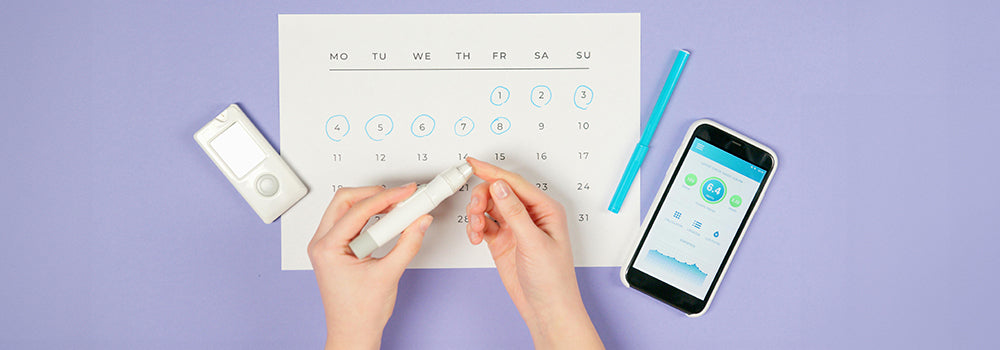10 Everyday Habits That Help Manage Diabetes (and Your Feet Will Thank You)

Managing diabetes requires a comprehensive approach that goes beyond monitoring blood sugar levels. Developing healthy daily habits can make a significant difference in controlling your diabetes and preventing complications, especially when it comes to your feet. Diabetes can impact your circulation and nerve function, leading to foot problems like poor circulation, swelling, and even serious conditions like diabetic foot ulcers.
By adopting the following 10 everyday habits, not only will you better manage your diabetes, but your feet will thank you for the extra care and attention.
1. Eat a Balanced, Diabetes-Friendly Diet
A well-balanced diabetes-friendly diet can help you maintain stable blood sugar levels, which is critical for preventing complications. Focus on whole foods, like fruits, vegetables, lean proteins, and whole grains, while limiting processed foods, refined sugars, and trans fats.
- Tip: Eating more fiber-rich foods can slow down the absorption of sugar into your bloodstream, preventing spikes in blood glucose.
2. Stay Hydrated
Drinking enough water is an essential habit for anyone, especially those managing diabetes. Dehydration can cause blood sugar levels to rise, leading to complications. Plus, staying hydrated is good for your skin and feet, helping to keep them supple and healthy.
- Tip: Aim for at least 8 glasses of water a day to maintain proper hydration and healthy blood circulation.
3. Check Your Blood Sugar Regularly
One of the most important habits for diabetes management is checking your blood sugar levels regularly. Monitoring your levels helps you make informed decisions about your diet, exercise, and medication.
- Tip: Keep a journal of your blood sugar readings and note any patterns so you can adjust your habits accordingly.
4. Wear Non-Binding Diabetic Socks
Wearing the right diabetic socks is an often-overlooked habit that can drastically improve your foot health. Non-binding diabetic socks like Dr. Johnny’s are designed to improve circulation without squeezing or restricting your legs, making them ideal for preventing swelling and other foot issues.
- Tip: Choose moisture-wicking, seamless socks that reduce friction and provide extra comfort throughout the day.
5. Exercise Regularly to Improve Circulation
Exercise is one of the best ways to control your blood sugar levels and boost circulation. Even light activities like walking, swimming, or stretching can make a big difference in managing your diabetes and keeping your feet healthy.
- Tip: Aim for at least 30 minutes of physical activity most days of the week to improve circulation and overall well-being.
6. Inspect Your Feet Daily
Diabetes can lead to nerve damage (neuropathy), which makes it difficult to feel cuts, sores, or blisters on your feet. Make it a habit to inspect your feet every day to catch any problems early and prevent them from worsening.
- Tip: Look for redness, swelling, cuts, or blisters, and see a healthcare provider if you notice anything unusual.
7. Moisturize Your Feet Daily
Dry skin is common in people with diabetes and can lead to cracks or sores that are prone to infection. Moisturizing your feet daily keeps your skin soft and reduces the risk of complications.
- Tip: Avoid applying lotion between your toes, as excess moisture in this area can lead to fungal infections.
8. Quit Smoking
Smoking is especially harmful for people with diabetes, as it worsens circulation problems and increases the risk of heart disease and diabetic foot ulcers. Quitting smoking can significantly improve your health and reduce your risk of foot complications.
- Tip: Talk to your healthcare provider about support programs or nicotine replacement therapies that can help you quit.
9. Control Your Stress Levels
Chronic stress can raise your blood sugar levels and contribute to poor diabetes management. Incorporating stress-relieving practices like meditation, yoga, or even spending time outdoors can help lower your stress and improve your diabetes control.
- Tip: Practice deep breathing exercises or take short breaks throughout the day to manage stress levels.
10. Get Regular Medical Checkups
Routine checkups with your healthcare provider are essential for managing diabetes and preventing complications. Make sure to schedule regular foot exams as part of your overall diabetes care routine.
- Tip: Ask your doctor to check for any signs of diabetic neuropathy or circulation issues that may affect your feet.

Conclusion: Small Changes, Big Impact
Managing diabetes doesn’t have to feel overwhelming. By making small, everyday changes to your diet, exercise routine, and foot care, you can significantly improve your health and avoid complications down the road. Start incorporating these habits into your daily routine today, and your feet will thank you!
If you’re looking for non-binding diabetic socks to protect your feet, check out Dr. Johnny’s range of specially designed socks that prioritize comfort, circulation, and foot health.
SHARE:









